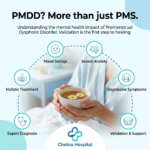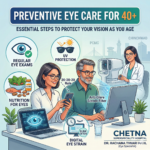Lower back pain is one of the most common health complaints among adults, especially those over the age of 40. While it may result from a variety of causes, one of the most frequent culprits is lumbar spondylosis — a degenerative condition affecting the lower spine. At Chetna Hospital, we believe in educating our patients about such conditions to ensure timely diagnosis and treatment.
What is Lumbar Spondylosis?
Lumbar spondylosis is a medical term for the age-related wear and tear of the spinal discs and joints in the lower back. Over time, the discs between the vertebrae lose water content and flexibility, leading to reduced cushioning. This causes the bones to rub against each other, resulting in pain, inflammation, and stiffness.
It is a form of osteoarthritis that specifically affects the lumbar spine, which includes the five vertebrae in the lower back region.
Common Causes
- Aging: The primary cause is the natural degeneration of the spine with age.
- Repetitive strain: Jobs or activities involving heavy lifting, bending, or twisting increase the risk.
- Sedentary lifestyle: Lack of regular movement weakens the supporting muscles.
- Obesity: Excess weight puts more pressure on the lower spine.
- Genetics: A family history of spine issues may increase susceptibility.
Symptoms to Watch For
While some people may not experience symptoms in the early stages, others may notice:
- Chronic lower back pain, especially after sitting or standing for long periods
- Stiffness in the morning or after rest
- Numbness or tingling sensation in the legs
- Weakness in the legs or feet
- Difficulty walking or maintaining posture
- Pain radiating from the lower back to the buttocks or thighs (sciatica)
Diagnosis
At Chetna Hospital, our spine specialists perform a detailed physical examination and may recommend imaging tests like X-rays, MRI, or CT scans to assess the extent of degeneration. Accurate diagnosis is crucial for effective treatment.
Treatment Options
1. Lifestyle Modifications
Regular low-impact exercises like walking, yoga, and stretching can strengthen back muscles and reduce stiffness.
2. Medications
Pain relievers, anti-inflammatory drugs, and muscle relaxants are often prescribed for symptom relief.
3. Physiotherapy
Targeted exercises and therapies improve mobility, reduce pain, and enhance spinal stability.
4. Interventional Treatments
In some cases, epidural steroid injections or other minimally invasive procedures may be recommended.
5. Surgery
For severe cases with nerve compression or spinal instability, surgical intervention like decompression or spinal fusion may be necessary.
When to Consult a Specialist
If your back pain persists for more than a few weeks, affects your daily activities, or is accompanied by numbness, weakness, or difficulty walking — it’s time to seek professional help. Early diagnosis and treatment can prevent complications and improve quality of life.
Book Your Consultation Today
At Chetna Multispeciality Hospital, our experienced spine specialists offer comprehensive evaluation and personalized treatment plans for lumbar spondylosis. Don’t ignore your back pain — let us help you live pain-free and active.
Contact us today to schedule your consultation and take the first step toward a healthier spine.
For Consultation Contact us on 9158680739 / 9158681123
Book Appointment – https://forms.gle/nRwUUS6H9duT3teH9
Website - www.chetnahospital.co.in
Address – Chetna Hospital, Sambhajinagar, MIDC, G Block, Near Rotary Club, Chinchwad 411019
.
.
.
#pune #pcmc #chinchwad #hospital #medical #medicalservices #spinesurgeon #backspecialist #sciatica #sciaticnerve #sciaticapain #sciaticatreatment #spinesurgery #spinespecialist #spinedoctor #backpaindoctor #endoscopicspinesurgery #orthopaedicsurgeon #mistlifsurgery #cervicalpain #spinalcord #rediculopathy #backpainrelief #slippeddisc #spine #neckpain #spinalstenosis #lumberlordosis #backbonesurgery













